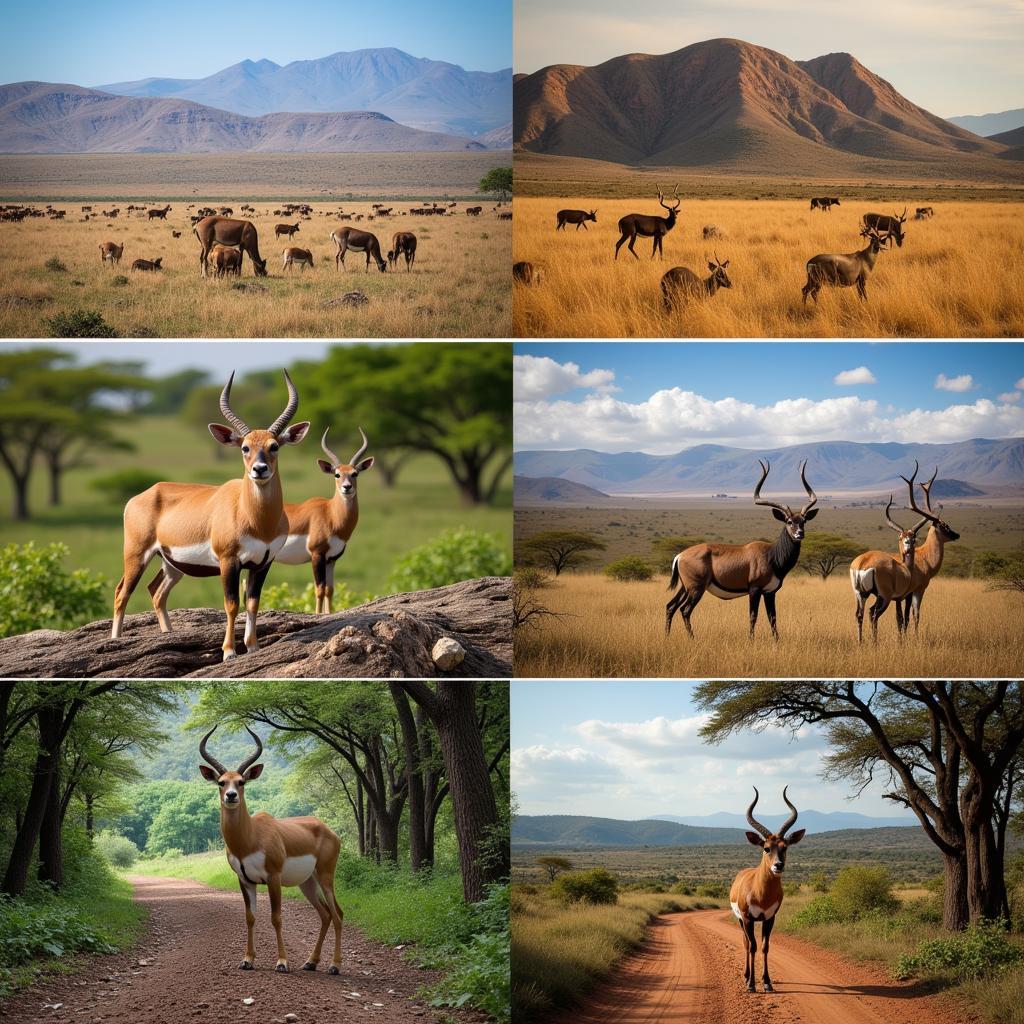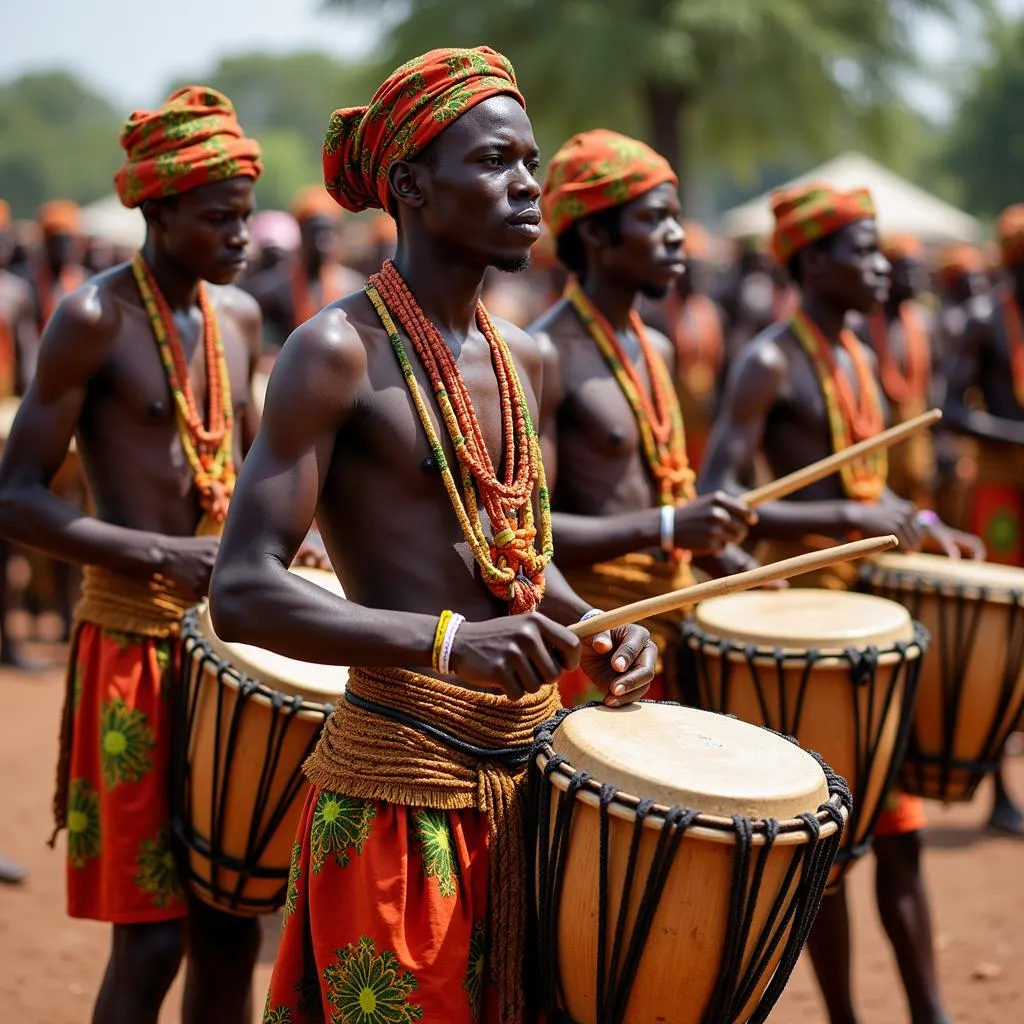Exploring the Diverse World of African Cattle Breeds
African Cattle Breeds represent a remarkable tapestry of genetic diversity, shaped by centuries of adaptation to the continent’s varied climates and landscapes. These breeds play a vital role in the livelihoods and cultures of millions across Africa, providing not only sustenance but also economic stability and cultural significance. Understanding the unique characteristics of these breeds is crucial for sustainable livestock management and preserving this valuable genetic resource. Let’s delve into the fascinating world of African cattle.
The Ankole-Watusi, with its majestic horns, is perhaps one of the most iconic African cattle breeds. But beyond its striking appearance, this breed possesses remarkable resilience to harsh conditions, thriving in arid and semi-arid regions. Other breeds, like the N’Dama, exhibit impressive tolerance to trypanosomiasis, a parasitic disease transmitted by the tsetse fly, which severely restricts livestock production in many parts of Africa. This natural resistance highlights the inherent value of these indigenous breeds. The diversity of African cattle breeds is truly remarkable, each with its own story to tell. From the small, agile Boran to the larger, heat-tolerant Nguni, these animals reflect the intricate interplay between nature and human interaction. Understanding these breeds is not just about appreciating their biological adaptations, but also about recognizing their integral role in the socio-economic fabric of African communities.
Key African Cattle Breeds and Their Adaptations
Several African cattle breeds have gained recognition for their unique traits and adaptability. The Boran, originating from Kenya, are known for their hardiness and ability to thrive in dry climates. They are also valued for their meat production. Similarly, the Nguni, with their distinctive multi-colored coats, are celebrated for their disease resistance and adaptability to various environmental conditions. African cattle are essential for many rural communities, offering a sustainable livelihood through milk, meat, and even draft power.
Other breeds, such as the Afrikaner, demonstrate impressive heat tolerance, making them well-suited to the hotter regions of the continent. This breed has also played a significant role in the development of other heat-tolerant cattle breeds worldwide. Exploring the diversity of african cattle reveals a fascinating world of genetic adaptation and resilience. These breeds offer valuable insights into sustainable livestock management practices, especially in the face of climate change.
The Cultural Significance of Cattle in Africa
Cattle hold profound cultural significance across many African societies. They are often seen as symbols of wealth, status, and prestige. In some cultures, cattle play a central role in traditional ceremonies, rituals, and marriage customs. The value placed on cattle goes beyond mere economic considerations, reflecting deep-rooted cultural beliefs and traditions.
Dr. Akinwumi Adesina, a renowned agricultural economist, emphasizes the cultural importance of cattle: “Cattle are not simply livestock in many African communities; they are a symbol of heritage, a cornerstone of tradition, and a living embodiment of cultural identity.”
Challenges and Opportunities for African Cattle Farming
While African cattle breeds possess remarkable adaptability, farmers face numerous challenges, including climate change, disease outbreaks, and limited access to markets and resources. Addressing these challenges requires a multi-faceted approach, encompassing improved breeding practices, sustainable grazing management, and access to veterinary services.
african cow breeds are a testament to the power of natural selection and the resilience of life in challenging environments. Investing in research and development to enhance the productivity and resilience of these breeds is crucial for securing food security and improving livelihoods across the continent.
Conclusion
African cattle breeds represent a rich tapestry of genetic diversity, shaped by centuries of adaptation and human interaction. Preserving and understanding these valuable genetic resources is paramount for ensuring sustainable livestock development and supporting the livelihoods of millions across Africa. By investing in research, promoting sustainable farming practices, and recognizing the cultural significance of these animals, we can help ensure a vibrant future for African cattle and the communities that depend on them. Learn more about other african domestic animals.
FAQ
-
What are some of the most common African cattle breeds? Some common breeds include the Ankole-Watusi, Boran, Nguni, N’Dama, and Afrikaner.
-
Why are African cattle breeds so important? They provide essential resources like milk and meat, contribute to economic stability, and hold significant cultural value.
-
What are the main challenges facing African cattle farmers? Challenges include climate change, disease, and limited access to markets and resources.
-
How can we support sustainable cattle farming in Africa? Investing in research, promoting better breeding practices, and improving access to veterinary care are crucial.
-
What is the cultural significance of cattle in Africa? Cattle often symbolize wealth, status, and play a vital role in traditions and ceremonies.
-
Are African cattle breeds adapted to specific environments? Yes, many breeds have adapted to thrive in diverse climates, from arid regions to areas with high disease prevalence.
-
Where can I find more information about African cattle? You can find more information on websites dedicated to agriculture, livestock, and African culture. Consider learning more about the african buffalo south or the african cow like animal.
Scenarios with Frequently Asked Questions
-
Scenario: A farmer wants to know which cattle breed is best suited for their arid land.
-
Question: “What are the best African cattle breeds for dry, arid conditions?”
-
Scenario: A researcher is interested in the disease resistance of certain African cattle.
-
Question: “Which African cattle breeds are known for their resistance to trypanosomiasis?”
Further Exploration
Consider exploring related topics like the impact of climate change on livestock farming in Africa, the role of women in cattle management, and the economic contribution of the livestock sector to African economies.
Contact Us
For further assistance, please contact us at Phone Number: +255768904061, Email: kaka.mag@gmail.com Or visit our address: Mbarali DC Mawindi, Kangaga, Tanzania. We have a 24/7 customer support team.



